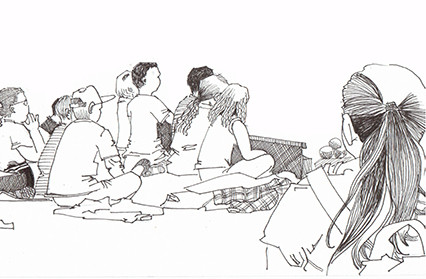Best-selling Young Adult author Lucy Christopher on what makes this area of literature so exciting, so vital, and why Hollywood is taking notice.
*
Young adult fiction, or YA, is big right now. It’s important. And the world is (finally) waking up to this.
At a recent libraries conference, publisher Barry Cunningham said, “YA fiction has saved publishing.” One glance at high street bookstores, particularly US giant Barnes and Nobel who prominently shelve YA at the front of stores, indicates YA is saving bookselling too. Then there are YA film adaptations like The Hunger Games, Twilight, Divergent and The Book Thief; my own novel, Stolen, too. Hollywood, also, is looking to YA.
Anyone who follows YA news will know the twitter hashtag #YASaves, and know it began as a reaction to Cox Gurden’s article in Wall Street Journal; the article argued there was too much darkness in YA. Soon after this article was published, #YASaves was trending worldwide. The New Yorker reported that tweets with #YASaves were posted at a rate of one per nanosecond. Thousands of readers, writers and book lovers joined forces about why YA fiction was so important to their emotional and mental well being: how it saved them.
I love the idea of YA being a lifeboat to contemporary publishing, bookselling and reading. I love that YA writers are being noticed as important. But I don’t write YA to save.
I write YA because I value freedom and possibility. YA celebrates these things. It does this through the way it is published and sold. It does this through its very words.
Being a young adult is all about possibility. As teenagers, most people begin to formalise who they want to be, what they want to believe in, and whom they want to love. Young adults make hard decisions, but they also explore possibility. For me, YA fiction is about opening up options, rather than shutting them down. YA fiction can act as a portal for how lives can be lived and beliefs can be explored. When I was a teenager, I certainly read YA like this – looking at how other teenagers might live, trying on the idea (for a few hundred pages at least) that I could do the same. YA fiction gives possibility to its readership.
I know this is true from readers I speak to: I’m often told that my novels have “made them think” or made them “wonder, for the first time, what it would be like to be in that situation.” YA opens internal and external worlds; provides voices when perhaps there are none.
Writing YA gives me freedom and possibility as a writer, too. There are few writers for adults who can write a fantasy novel, a romance, and a work of literary fiction, and have all their titles stocked on the same shelf in the same part of the bookshop. YA is not hemmed in by genre. If John Green were to write a kooky dystopian thriller it would still be shelved next to his romantic blockbuster, The Fault in Our Stars. This freedom allows me to think big: to open up with my writing. The novel I’m currently writing has elements of fantasy and grim reality; I haven’t given a thought to potential publishing constraints, instead I’ve focused on the story. In 2012, Publishers Weekly reported that 55% of YA was bought by adults; perhaps these big, unconstrained stories are part of the reason.
I find freedom and possibility within a YA audience also. Some of the most thoughtful, passionate and excited people I meet are teenagers. Some of the most free thinking, too. YA writers will know the buzz of chatting with teens about their favourite books and characters: watching them fizz with the excitement. On one train ride, I enthused with a thirteen year old beside me about why Peeta was better than Gale and why Katniss was such a great character: the journey took two hours. Earlier this week, when I was running a Creative Writing session in Bangor, the teens wrote stories about cursed deer bones, being stuck with giant tarantulas in lifts, and a family turning into zombie sheep. There was so much possibility in that room, it bubbled out onto the streets. Who wouldn’t want an audience that will go with whatever you throw at them?
I will never stop writing for teenagers because of this. Because YA publishing seems to understand the importance of being daring and taking risks. Because my books start a debate of possibility with exciting and open young minds. Because possibility and freedom saves. And because the world is finally noticing.












